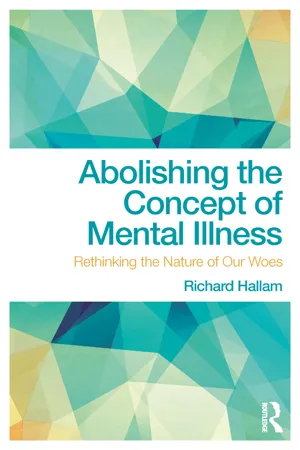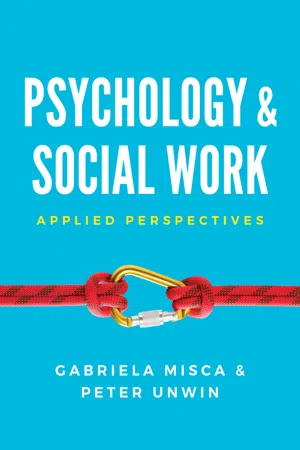Psychology
An introduction to mental health
"An introduction to mental health" provides an overview of the various factors that contribute to mental well-being, including biological, psychological, and social influences. It explores the prevalence of mental health disorders and the importance of early intervention and treatment. The introduction also emphasizes the significance of promoting mental health awareness and reducing stigma surrounding mental illness.
Written by Perlego with AI-assistance
Related key terms
1 of 5
10 Key excerpts on "An introduction to mental health"
- No longer available |Learn more
- Philip Banyard, Christine Norman, Gayle Dillon, Belinda Winder, Philip Banyard, Christine Norman, Gayle Dillon, Belinda Winder(Authors)
- 2019(Publication Date)
- SAGE Publications Ltd(Publisher)
MENTAL HEALTH, MENTAL ILLNESS AND PSYCHOPATHOLOGY Lead authors: Sarah McDonald, Palwinder Athwal-Kooner and Karen Slade 24 CHAPTER OUTLINE 24.1 INTRODUCTION 598 24.2 RISK OF HARM 598 24.3 HOW A MENTAL ILLNESS IS DIAGNOSED 602 24.4 WHAT IS THE POINT OF DIAGNOSIS? 603 24.5 FORMULATION 605 24.6 WHAT HAPPENS FOLLOWING DIAGNOSIS OR GOING TO THE DOCTOR WITH CONCERNS ABOUT YOUR MENTAL HEALTH? 608 24.6.1 Treatment 608 24.6.2 Psychological therapy 608 24.7 MAJOR PSYCHOLOGICAL THERAPY MODELS 609 24.8 EARLY MODELS: PSYCHODYNAMIC AND BEHAVIOURAL PSYCHOLOGY 609 24.8.1 Psychodynamic and psychoanalytic approaches 609 24.8.2 Behavioural approaches 610 24.9 1960s–1980s: DEVELOPMENTS FROM PSYCHODYNAMIC AND BEHAVIOURAL PSYCHOLOGY 611 24.9.1 Cognitive Behavioural Therapy 611 24.9.2 Humanistic and existential approaches 612 24.9.3 Attachment and developmental approaches 613 24.9.4 1980s onwards: proliferation of psychological therapies 614 24.9.5 Socio-cultural and community psychology 615 24.10 POWER–THREAT–MEANING FRAMEWORK 615 24.11 IN SUMMARY 615 24.12 GENERALISED ANXIETY DISORDER (GAD) 617 24.12.1 What is the best model to explain GAD? 617 598 APPLIED PSYCHOLOGY 24.13 SCHIZOPHRENIA 618 24.13.1 How can we best explain schizophrenia? 619 24.14 BULIMIA NERVOSA 620 24.14.1 How can we best explain bulimia nervosa? 620 24.15 MENTAL HEALTH AND WELL-BEING 621 24.16 WHERE TO NOW? THE CONCEPT OF RECOVERY 623 24.17 CHAPTER SUMMARY 624 DISCUSSION QUESTIONS 625 SUGGESTIONS FOR FURTHER READING 625 24.1 INTRODUCTION Every person has an awareness of their mental and emotional state, however difficult it is to describe in words. Right now, as you read this, you probably have a sense of whether you are in a good or bad mood, whether you are stressed, hungry, in pain or relaxed, whether you are worrying about someone else or yourself, and if you are paying attention or drifting off (hopefully not!). - eBook - ePub
- Alan Clarke(Author)
- 2013(Publication Date)
- Routledge(Publisher)
However, the World Health Organisation (WHO) offers a much broader definition when it defines mental health as ‘… a state of well-being in which the individual realises his or her own abilities, can cope with the normal stresses of life, can work productively and fruitfully, and is able to make a contribution to his or her community’ (WHO, 2001, p. 1). The reference to ‘a state of well-being’ takes this definition well beyond a consideration of purely psychopathological criteria. In fact, different groups of people tend to stress different aspects when attempting to determine what constitutes a mentally healthy life. On a simplistic level, the definition of mental health can be approached from any one of three broad perspectives: the personal, the societal and the professional. According to the personal perspective, an individual may reach a subjective judgement as to their own state of mental well-being by reflecting on how they feel. Assessments of a person’s mental state are also made from the perspective of the wider society. Here the emphasis is on how well the individual copes with the situational and normative requirements imposed by society. In other words, do they behave in what is considered to be a socially responsible and acceptable fashion? Finally, there is the view from the professionals, such as psychiatrists, psychoanalysts and clinical psychologists. Different practitioners highlight different elements of mental health according to their theoretical orientation and professional training. For example, some psychiatrists define mental health in terms of the absence of any manifestations of mental disorder, whereas psychoanalysts see the healthy personality as one in which the three elements (id, ego and superego) are not in conflict and exist in a state of intrapsychic equilibrium. There is variation both within and between these three broad ways of looking at the definition of mental health - eBook - PDF
Health Psychology
A Critical Introduction
- Antonia C. Lyons, Kerry Chamberlain(Authors)
- 2006(Publication Date)
- Cambridge University Press(Publisher)
1 Locating the field: introducing health psychology I hope I have convinced you of some simple but far-reaching truths. That our mental state and physical health are inexorably intertwined. That stress, depression and other psychological factors can alter our vulnerability to many diseases, including bacterial and viral infections, heart disease and can-cer. That the relationship between mind and health is mediated both by our behaviour and by biological connections between the brain and immune sys-tem. That these connections work in both directions, so our physical health can influence our mental state. That all illnesses have psychological and emotional consequences as well as causes. That there is nothing shameful or weak about the intrusion of thoughts and emotions into illness. That our social relationships with other people are central to health. That our dualist habit of contrasting mind and body, as though they were two fundamentally different entities, is deeply misleading. (Martin, 1997 , p. 314) The psychology of health, illness and health care needs to be considered in economic, political, ecological, social and cultural context. (Marks et al. , 2000 , p. 1) Learning objectives This chapter will provide an introduction to health psychology and locate studies of health and illness within their sociohistorical context. - eBook - ePub
- Anthony Curtis(Author)
- 2002(Publication Date)
- Routledge(Publisher)
1 Introduction to Health Psychology Defining health psychology Historical perspective on health and illness The biomedical model The biopsychosocial model Psychology and health Models of behaviour change SummaryWelcome to the fascinating area of health psychology! This text aims to provide an insight into the many fields that make up health psychology. You may be a student, nurse or other practitioner in the health field, or just seeking to find out more about your health and the role that psychology can play in understanding health states and health status. I hope that this book is of interest to you and relevant to your needs.Defining Health PsychologyIn trying to define health psychology, one must first try and define what is meant by ‘health’ as a concept. The most commonly quoted definition of health is provided in the Constitution of the World Health Organization (WHO, 1946):Health is a state of complete physical, mental and social well-being, and not merely the absence of disease or infirmity.This definition is considered to have positive and negative attributes by Downie et al. (1996). In the first part of the definition, they argue that health is seen in positive terms (i.e. the presence of a positive quality: well-being). In the second part of the definition, health is viewed (in a negative sense) as involving the absence of disease or infirmity (themselves negative in connotation). Taken together, the definition implies that true health involves both a prevention of ill-health (e.g. disease, injury, illness) and the promotion of positive health, the latter of which has been largely neglected.Banyard (1996) has criticised the above definition on the grounds that a state of complete - eBook - PDF
Health Psychology
Biopsychosocial Interactions
- Edward P. Sarafino, Timothy W. Smith(Authors)
- 2021(Publication Date)
- Wiley(Publisher)
We’ll look at several fields that are important Chapter 1 / An Overview of Psychology and Health 17 because they provide information and a context for health psychology. RELATED FIELDS Medicine provides an essential foundation and connec- tion for health psychology. To understand how psycho- logical factors can influence health and illness and how illness influences psychological outcomes like physical symptoms and emotional adjustment, we must have a basic understanding of the body’s healthy and unhealthy functioning. This understanding enables health psychol- ogists to make use of findings from biomedical research, see new points of connection between behavior and health, and help improve medical care. To offer useful ideas toward improving medical care, health psycholo- gists must know what the usual medical tests and treat- ments are for the various diseases and medical conditions, and how that care is usually delivered. To understand how medical conditions can affect patients’ psychological and social functioning, it is essential to understand their experience of the condition, its likely course, and the procedures they will undergo during typ- ical medical care. In many cases, the interventions health psychologists create are actually delivered by physicians and nurses during medical care, so it is not only the patient’s behavior that is the focus of change but the health care provider’s behavior as well (Spring, 2011). To accomplish this, health psychologists need to develop a working knowledge of medical fields and effective pro- fessional relationships with health care providers. Health psychologists also need to know the context in which health and illness exist. The field of epidemiology— the scientific study of the distribution and frequency of disease and injury—provides part of this context. - eBook - ePub
Abolishing the Concept of Mental Illness
Rethinking the Nature of Our Woes
- Richard Hallam(Author)
- 2018(Publication Date)
- Routledge(Publisher)
Very little of what the WHO publishes about mental health is consistent with its own definition. Well-being seems to be tagged on as an afterthought. For example, in its 2011 global survey of mental health (WHO, Mental Health Atlas, 2011), data were collected on the number of people treated and on service-user diagnoses at mental hospitals, general hospitals and outpatient facilities. The amount of money spent on pharmaceutical medications was taken as an indicator of the quality of a country’s mental health service. The survey therefore focused on diagnoses of mental illness and their treatment, mainly by members of the medical profession.Although the WHO Mental Health Action Plan (2013–20) is concerned with human rights and the promotion of well-being, the plan is primarily focused on people who have diagnosed mental disorders. One aim is to ‘systematically shift the locus of care away from long-stay mental hospitals towards non-specialized health settings’ (WHO, 2013: 16). Another aim is to develop information systems relating to ‘a core set of mental health indicators [presumably meaning ‘mental illness’ indicators]’ (ibid.: 16). The WHO’s chief message seems to be that so-called mental illness causes a loss of well-being, not that mental health (well-being) can be cultivated regardless of so-called mental illness.It comes as no surprise that the everyday use of mental health terminology mixes up literal and metaphorical meanings. For instance, how are we to interpret the claim made in one recent advertisement for a conference on mental health: ‘Sexual abuse in the UK is an epidemic disease which destroys the lives of many young children’ (Healthcare Conferences, UK, 2016)? On the one hand, is this hyperbole designed to arouse passions about a serious social phenomenon or, on the other hand, is it really being claimed that both perpetrators and victims are suffering from a disease?Another example of confusion can be found in the literature of some self-help movements. Rapping (1996: 39) comments that talk of physical or sexual abuse is sometimes conducted in terms of addiction. To construe abuse as mental illness is to take abusers as being addicted to abuse and the victims addicted to being abused. This, of course, conceals the moral, political, and social dimensions of abuse. In reality, perpetrators have committed a criminal offence. It is hard to see how framing abuse within a discourse of health can be justified at all. - eBook - PDF
International Perspectives on Mental Health
Critical issues across the lifespan
- Barbara Fawcett, Zita Weber, Sheila Wilson(Authors)
- 2011(Publication Date)
- Bloomsbury Academic(Publisher)
CHAPTER 2 Constructions of Mental Illness: From the Past towards the Future As we have seen in Chapter 1, interpretations of mental health and the policy and practice landscape have been fraught with tensions and debates. These relate to different conceptualizations about what constitutes mental health or mental well-being and, in turn, mental ill-health or mental distress. Returning to the emphasis placed by Bracken and Thomas (2001) on the central-ity of context, policy and practice can be seen to be influenced by how mental distress and mental ill-health and illness are con-structed at any particular point in time. As a result, terms such as mental health, mental distress, mental illness, mental disor-der, mental health problems and the associated challenges posed remain contestable. Challenging and changing constructions of mental illness Theoretical frameworks wax and wane in popularity and inform the perspective adopted when considering the nature of men-tal health and mental distress and illness. A question that can be posed is ‘Does a biomedical, psychological or sociological framework underpin the definitions and contribute towards par-ticular kinds of policy and service delivery?’ Fawcett and Karban (2005) argue that exploring ‘a wide range of theoretical per-spectives’ has clear advantages (2005: 12). Recent theoretical frameworks have included the social model of disability, which 27 28 M ENTAL H EALTH : A N O VERVIEW argues that it is not an ‘impairment’ that disables but exclusionary and discriminatory social, economic and political practices which deny civil rights (Oliver, 1983; Oliver and Sapey, 2006). A social causation approach seeks to highlight the interaction between social disadvantage and mental disorder (Golightley, 2006), whilst social constructionist perspectives critically interrogate taken-for-granted assumptions (Horwitz, 2002). - eBook - PDF
A Handbook for the Study of Mental Health
Social Contexts, Theories, and Systems
- Teresa L. Scheid, Eric R. Wright(Authors)
- 2017(Publication Date)
- Cambridge University Press(Publisher)
The experience of mental distress encompasses the complex interaction of neurology, psychology, and social factors, and as such is unlikely to be resolved by attempts to reduce it to any one factor. The sheer complexity of this felt suffering has meant – and will most likely continue to mean – that nosology will muddle along; classifiers will continue to have to nego-tiate incomplete science and political concerns, to develop working definitions and classifications that are vulnerable to criticism, dissatisfaction, resistance, and conten-tious politics. The stakes are too high, the lack of knowledge too great, for it to be otherwise. 66 There are three ways to conceive of mental health. The pathogenic approach views mental health as the absence of mental illness. The salu-togenic approach views mental health as the presence of positive emo-tional states and positive functioning. The third approach is the complete state model, which derives from the ancient word for health as being hale, meaning whole. This approach is exemplified in the World Health Organization’s definition of health as a complete state, where mental health consists of the absence of mental illness and the presence of pos-itive emotional states and positive functioning. This chapter reviews evi-dence supporting the complete state model, showing strong empirical support for the two continua model at the phenotypic and genotypic lev-els. Studies are reviewed making the case for promoting and protecting positive mental health to prevent mental illness and to improve overall psychosocial functioning of individuals and population health. - eBook - ePub
Psychology and Social Work
Applied Perspectives
- Gabriela Misca, Peter Unwin(Authors)
- 2017(Publication Date)
- Polity(Publisher)
Social workers will come into contact with a range of adults and children who are receiving different clinical inputs from the field of psychology – adults who are experiencing mental health problems, older people who have been bereaved, carers under stress, victims of sexual and other abuse. Much contemporary social work is concerned with risk assessment, the rationing of resources and managing performance to budget, but it is important that social workers are curious and have insight into the nature of the clinical interventions being experienced by their clients. All social workers need counselling skills, but they also need some additional understanding of the skills and interventions which colleagues may be employing in working towards common goals of rehabilitation or improvement in mental well-being.Definitions
The applied field of clinical psychology is preoccupied with understanding, defining and identifying mental health disorders in people. Clinical psychologists use different theoretical frameworks to understand how mental illness is caused and how mental illnesses are classified and identified or diagnosed and treated. Their aim is to reduce long-term psychological distress and to alleviate its associated problems in individual ability to function, and they work mainly within health and social care settings with individuals presenting with, among a range of other conditions and issues:- mental health problems (such as depression, anxiety and schizophrenia)
- physical health problems (chronic physical illness with a significant mental impact, such as cancer)
- personal and family relationship problems.
Clinical psychologists try to help people to understand their thoughts and behaviours, and in this respect it is important to distinguish them from psychiatrists, who are medical professionals whose main interventions for clients with mental illness involve the assessment and monitoring of medication regimes. In the UK, mental health provisions are delivered by multidisciplinary teams of professionals, who provide a range of skills. Clinical psychologists and social workers will often work together with doctors, nurses and occupational therapists across a range of settings; it is therefore important that social workers have a good understanding of the role of a clinical psychologist. - eBook - PDF
Journeys Through Mental Illness
Client Experiences and Understandings of Mental Distress
- Juliet Foster(Author)
- 2018(Publication Date)
- Red Globe Press(Publisher)
Defining mental ill health A natural starting point for discussion of any form of understanding is definition. How do individuals categorise and name a concept; in the words of social representations theory, how do they anchor and objectify it? This is particularly relevant in studies of the understanding of mental health problems: one theorist (Rose, 1996a; 1998) argues that mental illness proves too difficult to anchor and, as such, represents a failure of representation. According to Rose (1996a; 1998), mental illness is the ultimate in unfamiliarity and, because of the fear associated with it, remains Other, and uncomfortably undefined. It is certainly true that some clients find it very hard to define what mental ill health is. I would, however, agree with Morant (1996) that this is due more to mental ill health being repre-sented as incomprehensible, as we saw in the discussion of public understanding in Chapter 2, rather than it being a failure of representation: it is not that mental illness cannot be defined in any way. We all have an idea of what is meant by the term ‘mental illness’, even if that idea might entail notions of incomprehensi-bility, and of unfamiliarity. What is clear from this study and those discussed in earlier chapters is that most clients of the mental health services work hard to understand and to define, to make meaning out of the concept of mental ill health. In this chapter, I will discuss some of the strategies that clients use in defining mental ill health, and therefore in making sense out of it. Having first focused on some of the ways that clients use diagnosis, reference to physical illness, and to the abnormality or normality of mental health problems, I will move on to discuss the way that clients, ultimately, define mental ill health by and through their own experiences (Foster, 2004).
Index pages curate the most relevant extracts from our library of academic textbooks. They’ve been created using an in-house natural language model (NLM), each adding context and meaning to key research topics.









